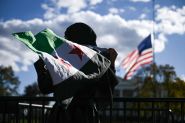- Home
- Middle East
- The Flood that Sunk the Palestinian State

©This is Beirut
When the world needed Palestinian grownups to help solve the problems in Gaza, it found none. The PLO was too corrupt and Hamas too irrational.
The Palestinian state is now history, owing to Hamas’s 2023 Al-Aqsa Flood attacks on Israel that dealt a fatal blow to Palestinian nationhood, a project that began in 1968 and peaked with the 1993 Oslo Accords. Hamas’s folly has prompted the UN Security Council to consider ending its longtime orthodoxy in support of a Palestinian state and reviving instead international mandate-style authority over Palestinians, this time under a Board of Peace (BOP), led by the U.S.
When the world needed Palestinian grownups to help solve the problems in Gaza, it found none. The PLO was too corrupt and Hamas too irrational. From now on, the BOP will represent Palestinians, manage their affairs, rebuild Gaza, and decide their fate. The Board will appoint a technocratic committee togovern the Strip and deploy an international force to police it. Even though the BOP’s term is set at two years, the Palestinian problem teaches us that everything intended as interim ends up becoming permanent.
The anticipated UN Security Council resolution on Gaza will effectively replace all previous understandings concerningPalestinians. The Palestine Liberation Organization (PLO) will cease to be the “sole and legitimate representative of the Palestinian people,” as outlined by the UN General Assembly in 1974. The recent wave of recognition of a “Palestinian state” will amount to nothing.
The celebration of the Al-Aqsa Flood is mind-boggling. Many argue that the Flood led world capitals to recognize the Palestinian state. Others went as far as saying that the Flood awakened the world and resulted in the election of Zohran Mamdani as mayor of New York. But in reality, the Flood ended the Gaza Strip’s autonomy, decimated Hamas and demonstrated that the PLO is a relic of the past.
Renewing the international mandate over Palestinians might help manage their affairs, but will not solve their problems. Until Palestinians grow up, become realistic in their view of the world, understand cause and effect – and prioritize them over history and emotion – their self-determination will remain elusive.
Perhaps the Palestinians, like the people of many failing Arab states, were not cut out for sovereignty. Perhaps they fare better under the rule of others. Consider the Gulf, for example, where hundreds of thousands of Palestinians thrive. They live, work, and raise their families, but have no political rights whatsoever. Then ask any Palestinian whether they would want to trade places with a Lebanese in Lebanon or a Syrian in Syria, where the Lebanese and Syrians are sovereign and enjoy full political rights, but have failed to set up states capable ofoffering a fraction of the good life that Arab expats enjoy in the Gulf. A rational Palestinian will likely choose life in the Gulf rather than under a corrupt and failing — even if sovereign — Palestinian state.
Sovereignty is a means not an end. Sovereignty is supposed to serve the interests of its people, not cause their endless death and misery. As per the famous Maslow Hierarchy of Needs, good life trumps political rights.
It is ideal when humans can have both — high standards of living in their own sovereign state — like in Israel, the U.S., and many other states around the world. But if sovereignty is prohibitively costly and unattainable, as in the case of Palestinians, why waste another century throwing away the lives of one generation after another? What happens if Palestinians get their sovereign country? They will, in all likelihood, construct a failed state whose population periodically engages in civil war and communal violence.
The Al-Aqsa Flood ended Palestine. In Lebanon, it killed Hezbollah. The Lebanese have had a year to restore their sovereignty, but have refused to revive their nation-state. Instead, they continue to peddle fallacies about a state that shares its sovereignty with a militia.
Hamas in Gaza peddles similar falsehoods, announcing that it will not govern Gaza again, but that it will linger in the West Bank and Gaza as an auxiliary force, a “resistance” that will spring into action whenever the homeland is in danger. The paradox is that while such “resistance” militias are too weak to defend the homeland, their grip on power is so strong they have been suffocating their nations and undermining their sovereignty.
Hamas and Hezbollah invited destruction on themselves and their populations. They would do the Palestinians and the Lebanese a favor if they admitted fault and retired. But knowing that Islamism is delusional, Islamist militias will never stop rearming and warring. They will focus all their energy on rebuilding their ranks, at the expense of building sovereign states and good governments. The end result is more losses and more death, nothing else.
Read more




Comments